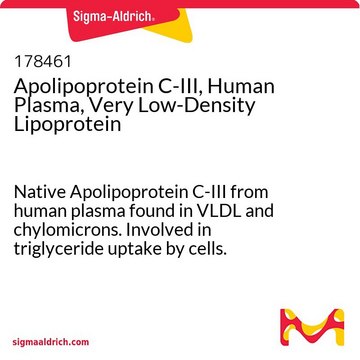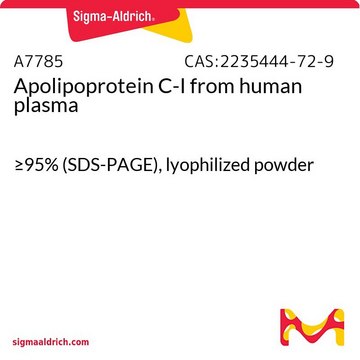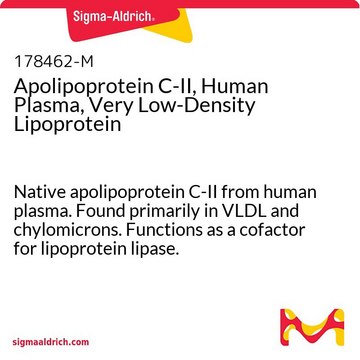A7910
Apolipoprotein C-II from human plasma
≥95% (SDS-PAGE)
Sign Into View Organizational & Contract Pricing
All Photos(1)
About This Item
Recommended Products
biological source
human
Quality Level
Assay
≥95% (SDS-PAGE)
form
powder
mol wt
average mol wt 8.8 kDa
technique(s)
ligand binding assay: suitable
UniProt accession no.
storage temp.
−20°C
Gene Information
human ... APOC2(344)
General description
Apolipoprotein C-II (APOC2/apoC-II), a small exchangeable apolipoprotein, is expressed in the liver and secreted into plasma. It is present on the triglyceride-rich lipoproteins (TRL), like chylomicrons (CM) and very-low-density lipoproteins (VLDL), and high-density lipoproteins (HDL), mainly during fasting. The intestine, macrophages, adipose tissue, brain, skin, lungs, retina, and retinal pigment epithelium are among the tissues that produce ApoC-II.
Application
Apolipoprotein C-II activates lipoprotein lipase and has been used in a study to assess HDL proteome in hemodialysis patients. An excess of apolipoprotein C-II is associated with increased triglyceride-rich particles and alterations in HDL particle distribution.
Biochem/physiol Actions
Activates lipoprotein lipase
Apolipoprotein C2 (APOC2) serves as an activator of lipoprotein lipase. It is involved in the hydrolysis of triglycerides (TG) on TG-rich lipoproteins (TRL) to release free fatty acids (FA). Higher expression of APOC2 is observed in patient-derived glioblastoma stem cells, hypopharyngeal cancer, invasive ductal breast cancer, clear cell renal cell carcinoma, gastric cancer, centroblastic lymphoma, early-stage colorectal tumor, and skin squamous cell carcinoma. ApoC-2 is considered as a new sensitive biomarker for diagnosing Takayasu arteritis (TAK).
Storage Class Code
11 - Combustible Solids
WGK
WGK 3
Flash Point(F)
Not applicable
Flash Point(C)
Not applicable
Choose from one of the most recent versions:
Already Own This Product?
Find documentation for the products that you have recently purchased in the Document Library.
Our team of scientists has experience in all areas of research including Life Science, Material Science, Chemical Synthesis, Chromatography, Analytical and many others.
Contact Technical Service








